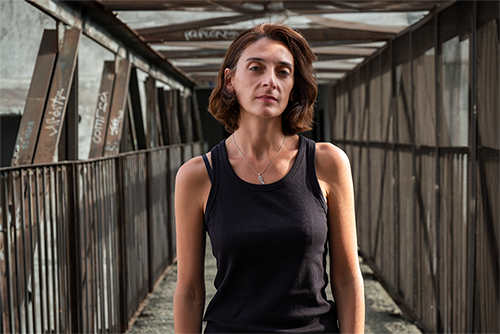This interview was organised by the Human Rights House Tbilisi for the third edition of the “Portraits of Strength” photo exhibition. The photo was taken by Tamta Chkhaidze, at one of the bridges connecting “Shatili Buildings” in Tbilisi, Georgia, September 2024.
When did you realise you were a human rights defender?
“I came to realise that I am a human rights defender only after becoming professionally involved with a human rights organisation. I believe this understanding isn’t something that happens in a single moment, but rather a lifelong journey that begins maybe also in childhood—a blend of values, aspirations, and goals that shape who we are.”
What is the nature of your work and what challenges do you face as a Woman Human Rights Defender?
“My work involves collaborating with human rights defenders and non-governmental organisations, as well as supporting individuals often in challenging situations. Connected with leading the organisation, my role is diverse and engaging, encompassing strategic planning, defining the organisation’s direction, project management, and international advocacy for the protection of various rights. This also includes raising awareness through campaigns and providing services to our target groups.”
“I’ve faced challenges and resistance because of my criticism, differing opinions on certain issues, expressions of solidarity, and public calls for change. Unfortunately, human rights work in Georgia has become unsafe, especially under restrictive legislation, including laws targeting LGBT rights and the recent ’foreign agents’ law.”
What is the current human rights situation in your country? [Updated 10 December 2024]
“Today, people in Georgia are fighting against authoritarianism. Through restrictive legislation, repressive policies and practices, heavy human rights violations from the side of state authorities. The government is attacking anyone who is standing up for their rights and freedoms.”
“After the manipulated and fraudulent parliamentary elections on October 26 2024, Georgia’s authorities announced to halt EU accession. As a response, large-scale protests are being held throughout the country. The actions and violations from the side of police against peaceful protesters are unbearable: violent crackdown on peaceful demonstrators, torture and ill-treatment, attacks on media representatives covering the protest.”
“Now is again the time to be as vocal and as loud as possible on the ongoing situation in Georgia. International support is needed: long-term monitoring missions, and international media coverage of everyday events should be planned and all available international mechanisms should be used – the protest is becoming more massive and police brutality & repressions are continually increasing.”
All of this clearly indicates that the state directly attacks human rights and is primarily responsible for heavy human rights violations. Rapid democratic decline and the shift toward authoritarian rule are already a reality in Georgia.
“Despite this, the country has a strong and active civil society. In light of these recent events, more people are stepping up as human rights defenders and becoming involved in voluntary civil society efforts. Together, we are all fighting for survival. I am hopeful, though, that the people will win this fight for democracy: where the main goal is to disrupt one-party authoritarian rule and steer Georgia back toward the path of European integration.”
What kind of human rights situation in your country would you like to see in the next 30 years?
“After 30 years, my wish is to have such a system and society where people, their rights and freedoms will be the main value. If this is the basis, the common value on which different policies can be based, then we will live in a better world.”
Can you describe your motivation to be a human rights defender?
“I believe the primary motivation behind my human rights work is the fight for equality—equal rights and freedoms for all. When individuals are in an equal environment, they can advocate for their own rights and opportunities. However, those who find themselves in unequal situations, where the state and privileged groups often stand in opposition, need the support of human rights defenders.”

About Portraits of Strength
Women human rights defenders (WHRDs) work to protect and advance freedoms while facing discrimination and stereotypes about their role and participation in society.
HRHF seeks to honour and promote independent women human rights defenders and their work through the “Portraits of Strength: Women Defending Human Rights” photo exhibition and highlight the human rights situation in the countries of the Network of Human Rights Houses.
The exhibition, now in its third edition, shares portraits and stories from WHRDs working on a variety of issues including the documentation of human rights violations and alleged war crimes, rule of law, women’s rights, political prisoners, freedom of expression, and more.
Find out more here.





